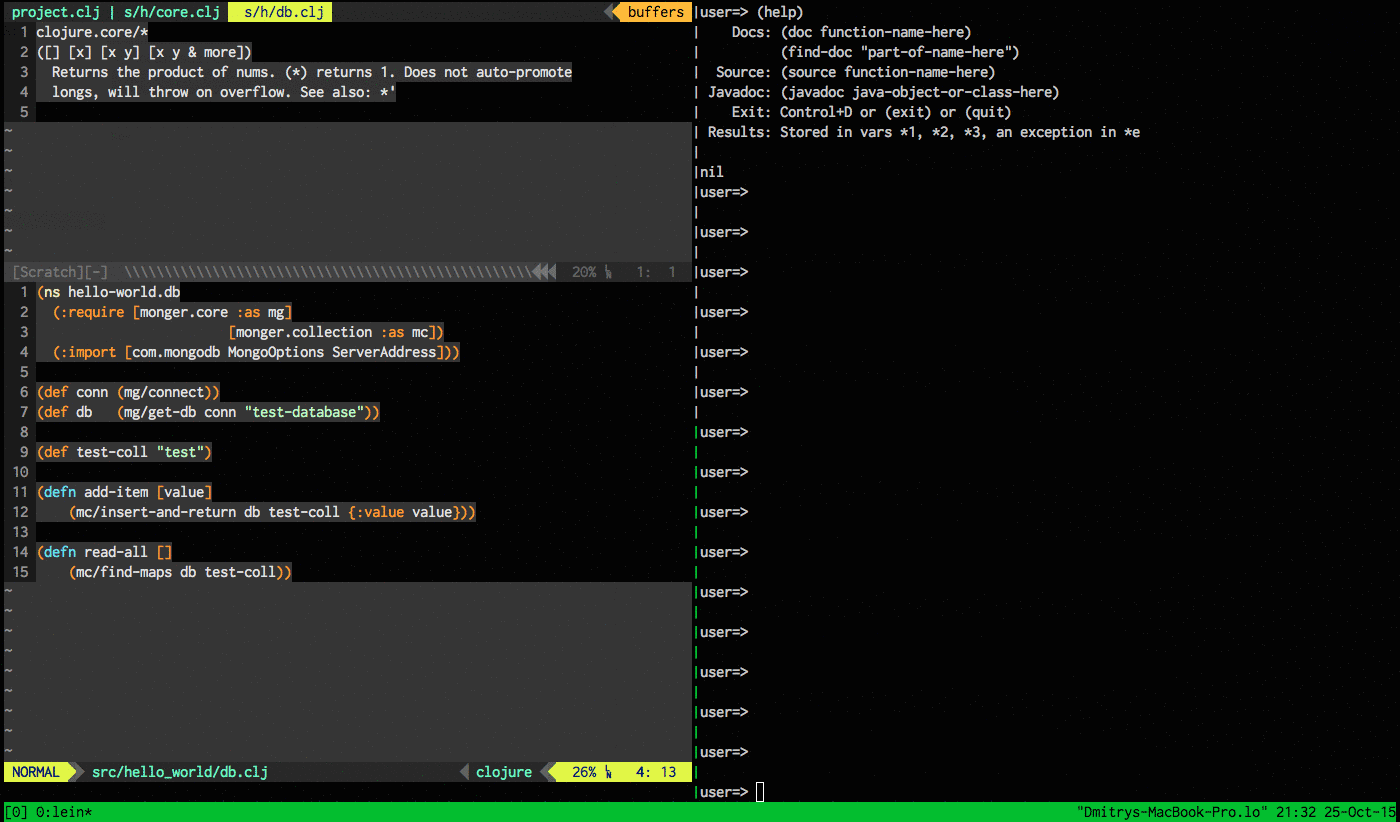Clojure Hello World
Recently I strated learning clojure. It seems it’s interesting language with functional concepts and deep integration with JVM. I’ve read the book ‘The Joy of Clojure’ and watched several screencasts and video records from conferences.
You can start with this one:
Clojure
Here are the core concepts of clojure:
- Clojure is functional;
- It’s LISP, so syntax looks wierd first time due to the big amount of parentheses, but then you’ll realize it’s very convenient for coding;
- It has deep integration with JVM - it’s run on JVM. It means all JVM libraries will work out the box;
- There is REPL and it’s amazing;
- More info is here.
Here is the Awesome Clojure page. And you should check this out.
My Hello World
First of all, you need to install leiningen. You can find how to do it here. And also you need to pick which IDE/editor you’ll use for coding. Currently, I’m using vim and I wrote a post about basic vim configuration.
I don’t have deep expertise in clojure yet and I just would like to share my clojure-hello-world application.
It’s going to be a simple app that does a few simple functions:
- Exposes an http api with 2 methods: add item and read all items
- Stores data in mongodb
To start new project, you need to execute one simple command:
$ lein new hello-worldIt’ll create basic clojure project structure.
Database layer
I poke around and found out that most common lib for mongo is Clojure Monger. If you look at its documentation you’ll see that it’s really simple and clear. Now we need to add it to dependencies.
Go to project.clj in the root of the project and modify :dependencies as follows:
:dependencies [[org.clojure/clojure "1.7.0"]
[com.novemberain/monger "3.0.0-rc2"]]Then we’re ready to create namespace where all functions related to db will go. Create file src/hello-world/db.clj and write this code:
(ns hello-world.db
(:require [monger.core :as mg]
[monger.collection :as mc])
(:import [com.mongodb MongoOptions ServerAddress]))
(def conn (mg/connect))
(def db (mg/get-db conn "test-database"))
(def test-coll "test")
(defn add-item [value]
(mc/insert-and-return db test-coll {:value value}))
(defn read-all []
(mc/find-maps db test-coll))It connects to mongo using default port and works with database named test-database and collection test.
Once you have written this code and saved it you can check this out in REPL. Type (use 'hello-world.db) in repl and you’re all set to
test these functions.

Web portion
In clojure world, the most common approach for web development is ring framework.
Ring is a Clojure web applications library inspired by Python’s WSGI and Ruby’s Rack. By abstracting the details of HTTP into a simple, unified API, Ring allows web applications to be constructed of modular components that can be shared among a variety of applications, web servers, and web frameworks.
Let’s add it to our dependencies:
:dependencies [[org.clojure/clojure "1.7.0"]
[com.novemberain/monger "3.0.0-rc2"]
[ring "1.4.0"]
[ring/ring-json "0.4.0"]
[compojure "1.4.0"]])I added two more libraries ring/ring-json and compajure. The first one is a middleware to convert clojure maps to json in requests and
responces. The second one is for very convinient routing.
(ns hello-world.core
(:use ring.adapter.jetty)
(:use ring.middleware.reload)
(:require [compojure.core :refer :all]
[compojure.route :as route]
[compojure.handler :as handler]
[ring.middleware.json :as middleware]
[cheshire.core :refer :all]
[cheshire.generate :refer [add-encoder]]
[hello-world.db :as db]))
; Custom converter for ObjectId objects
(add-encoder org.bson.types.ObjectId
(fn [c jsonGenerator]
(.writeString jsonGenerator (str c))))
(defroutes app-routes
(GET "/" []
(db/read-all))
(POST "/" request
(let [value (:value (:body request))]
(db/add-item value)
(println (str value " is added")))
"ok")
(route/not-found "Not found"))
(def app
(-> (handler/site app-routes)
; Middlewares for json support
(middleware/wrap-json-body {:keywords? true})
middleware/wrap-json-response))
(defn boot []
(run-jetty #'app {:port 8080}))That’s it. All you need is to start the app. Go to the repl and type (use 'hello-world.core) and then (boot). And you can test it:
$ curl -X POST -H "Content-Type: application/json" -d '{"value":"my value1"}' http://localhost:8080/and
$ curl -X GET http://localhost:8080/Conculsion
This is a very simple clojure example. And I like it. It’s really small and expressive code. I bet the same demo in java would require 10 times more lines of code. It’s worth noting that the big advantage of development in clojure is repl interaction - it’s amazing. I know this small app can be dramatically improved and can be written canonically. But it’s my first try and I know where I should dig into.